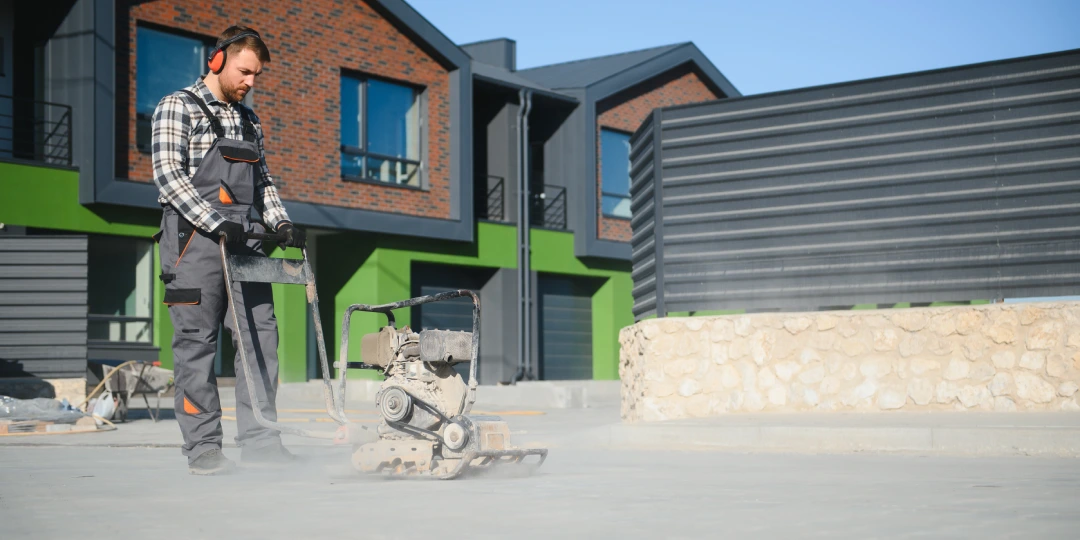Introduction: Silica’s Hidden Risks on Nashville Job Sites
Silica is ever-present on Nashville job sites, whether crews are engaged in tearing out old concrete, preparing a foundation, or working with engineered stone. While silica is a naturally occurring mineral, the danger arises when it is disturbed and reduced to dust small enough to be inhaled. Once airborne, these particles are invisible to the naked eye, blending into the routine dust of a busy site, making it easy for workers to underestimate or ignore the risks they pose during daily operations.
The risk of silica exposure is particularly acute during common construction tasks such as concrete cutting, jackhammering, or block drilling. Each of these tasks can generate clouds of fine silica dust, which can linger in the air, exposing workers even after the immediate work is complete. Nashville’s warm, dry seasons can exacerbate this risk, as breezes move dust across work zones and into adjacent areas, increasing the potential for secondary exposure for workers who are not directly involved in dust-generating activities.
Silica’s dangers are not limited to individual health risks alone. Unchecked, the presence of silica dust can also impact project timelines if regulators halt work for non-compliance or if workers fall ill due to prolonged exposure. Contractors in Nashville face growing accountability for monitoring and controlling the levels on site, making it critical to view silica safety as a core part of project planning and daily site management rather than an afterthought or a box to check.
Understanding Crystalline Silica and Its Health Impacts
Silica, in its crystalline form, poses a severe health threat when inhaled, as its sharp, microscopic particles embed themselves deep within lung tissue. This exposure can lead to silicosis, a progressive and incurable lung disease characterized by scarring that reduces lung capacity over time. The latency period for silicosis can vary, with symptoms sometimes appearing after many years of consistent exposure, making it easy for workers to remain unaware of the damage occurring within their lungs until it becomes irreversible.
Beyond silicosis, it is classified as a human carcinogen and has been linked to lung cancer, chronic obstructive pulmonary disease (COPD), and kidney disease. The inhalation of silica particles can trigger inflammation in lung tissues, leading to chronic respiratory conditions that severely impair a worker’s quality of life. Workers exposed to silica often report chronic coughing, difficulty breathing, and fatigue, symptoms that can escalate into life-threatening complications if exposure continues unchecked on Nashville’s busy worksites.
Silica’s health impacts carry heavy consequences for contractors as well. Beyond the human cost, the financial implications tied to silica-related illnesses include medical expenses, workers’ compensation claims, and potential lawsuits, all of which can severely affect a contractor’s operations and reputation. By understanding the nature of crystalline silica and the seriousness of its health impacts, contractors in Nashville can take informed, proactive steps to protect their workforce and maintain compliance with evolving safety regulations while fostering a safer, healthier job site culture.
OSHA’s Silica Standards: What Nashville Contractors Must Know
Silica exposure on construction sites is not only a health concern but a legal one under OSHA’s Respirable Crystalline Silica Standard. This regulation sets a permissible exposure limit (PEL) for silica dust at 50 micrograms per cubic meter of air over an 8-hour shift, a standard designed to protect workers from the gradual damage caused by inhaling fine silica particles. For Nashville contractors, understanding and integrating this limit into daily site practices is not optional, as non-compliance can result in significant fines and enforced work stoppages.
Beyond the PEL, OSHA’s standard mandates that employers implement a written exposure control plan outlining tasks that involve silica, control methods, and procedures to restrict access to high-exposure areas. This means contractors must actively manage how and when silica dust is generated and ensure protective measures such as water suppression or local exhaust ventilation are used during dust-producing activities. Regular inspections and updates to control plans are necessary to reflect project changes, ensuring silica management remains consistent across different phases of a project in Nashville’s dynamic construction environments.
Medical surveillance is also a requirement under OSHA’s silica standard for workers who are exposed to silica at or above the action level of 25 micrograms per cubic meter for 30 or more days a year. Contractors in Nashville must provide medical exams, including chest X-rays and lung function tests, to monitor the health of their crews over time. This surveillance helps detect early signs of silica-related illnesses, giving workers the opportunity to address health concerns before they escalate while allowing employers to demonstrate compliance and commitment to worker safety.

Common Silica Exposure Points in Construction and Industry
Silica becomes a hazard in numerous common construction and industrial activities, many of which are routine on Nashville job sites. Cutting and sawing concrete, brick, or stone, for example, releases fine silica particles into the air, particularly when performed without dust suppression methods. Masonry drilling, jackhammering, and grinding are similarly high-risk tasks that produce clouds of dust that workers can easily inhale if protective measures are not in place. These activities occur frequently on commercial renovations, roadworks, and new builds across Nashville, making silica exposure a persistent risk across many trades.
Even tasks that seem low-risk, like sweeping dry floors or handling silica-containing materials, can generate airborne silica dust. In industrial maintenance, abrasive blasting with the sand is another high-exposure activity, releasing large quantities of respirable silica into the workspace. The risks extend beyond the immediate work area, as dust can settle on surfaces and become airborne again when disturbed, exposing workers who may not even be engaged in the dust-producing activity. Nashville’s weather, with frequent dry periods, can further aggravate the dispersion of silica dust across open sites.
Identifying these exposure points is critical for contractors aiming to control silica risks effectively. A comprehensive management plan requires mapping out job tasks, understanding when and where the dust is produced, and assessing which workers are at risk during each phase of a project. This granular understanding allows Nashville contractors to implement targeted controls, ensuring protection is proactive rather than reactive, thereby preserving productivity while safeguarding worker health.
The Cost of Non-Compliance for Contractors
Ignoring silica safety standards can have severe consequences for contractors operating in Nashville’s competitive construction market. OSHA fines for silica-related violations can reach tens of thousands of dollars per infraction, especially if repeated violations or willful negligence is discovered during inspections. Beyond financial penalties, non-compliance can lead to stop-work orders, delaying projects, disrupting schedules, and jeopardizing critical delivery dates that can impact client trust and future business opportunities.
The human cost of silica exposure is even more consequential. Workers who develop silicosis, lung cancer, or chronic respiratory diseases may require long-term medical care, face reduced earning capacity, or be forced to leave the workforce entirely. Contractors may face lawsuits from affected workers or their families, leading to costly settlements and increased insurance premiums. These outcomes not only affect the financial stability of a business but can also damage its reputation in the Nashville community, where word-of-mouth and trust are essential for securing ongoing projects.
Contractors in Nashville must view silica compliance not as a regulatory burden but as a necessary investment in workforce health and business continuity. By prioritizing the safety, contractors can avoid the cascading costs of non-compliance while fostering a culture of responsibility and care on their job sites. This approach demonstrates leadership within the industry, positioning the contractor as a partner that values its workforce and takes active measures to ensure safety and regulatory adherence, ultimately strengthening relationships with clients, regulators, and employees alike.
How Fortier Loss Control Assesses Silica Risks
Silica management begins with precise assessment, and Fortier Loss Control brings this expertise directly to Nashville job sites. Their process starts with a comprehensive walkthrough, observing work tasks that may generate silica dust while evaluating the current control measures in place. Using calibrated instruments, Fortier measures airborne silica concentrations at various points throughout the workday, capturing the real conditions workers face. This method provides a clear, quantifiable understanding of exposure levels, replacing guesswork with data-driven clarity.
The assessment goes beyond just capturing numbers. Fortier’s team identifies high-risk areas where the dust accumulates, whether it’s during concrete cutting in a confined renovation space downtown or while workers are engaged in large-scale slab demolitions on infrastructure projects. By analyzing workflows, equipment used, and site layout, Fortier pinpoints opportunities for engineering and administrative controls that reduce silica dust generation at its source. This targeted analysis enables contractors to address silica exposure precisely, avoiding unnecessary disruptions to the overall workflow.
Fortier’s silica assessments also include a thorough review of existing safety documentation and practices. They examine the contractor’s current silica exposure control plan, medical surveillance programs, and PPE usage, identifying gaps that could expose crews to unnecessary risk or lead to non-compliance with OSHA standards. By combining field measurements with operational audits, Fortier provides Nashville contractors with a complete snapshot of their silica management practices, offering clear, actionable recommendations for immediate improvement.

Tailored Safety Plans for Nashville Contractors
Every contractor faces unique silica challenges depending on their specific operations, crew size, and type of work. Fortier understands this and crafts customized silica safety plans that align with the realities of Nashville’s job sites. These plans are not generic templates but detailed roadmaps that address the precise tasks that generate silica dust within the contractor’s operations, recommending feasible engineering controls, appropriate PPE, and workflow adjustments that integrate seamlessly into existing site processes.
The tailored plans Fortier develops include clear procedures for dust suppression, such as using water delivery systems during concrete cutting or implementing local exhaust ventilation for drilling tasks. These measures are explained in practical terms, allowing crews to understand how to implement them without slowing down their work. Each plan also defines the responsibilities of site supervisors and crew members, ensuring everyone knows their role in maintaining silica safety, thereby reinforcing accountability at every level.
Documentation is another critical aspect of these tailored safety plans. Fortier ensures that contractors maintain a comprehensive written silica exposure control plan that complies with OSHA’s standards, including task-specific hazard assessments, control measures, and medical surveillance protocols. This level of preparation allows Nashville contractors to confidently handle inspections and inquiries while demonstrating a commitment to protecting workers and adhering to regulatory requirements.
Training Crews for Effective Dust Control
A plan is only as effective as the people who execute it. Recognizing this, Fortier provides thorough training for crews on effective silica dust control practices tailored to Nashville’s diverse job sites. Training sessions are delivered in practical, clear language that resonates with workers, focusing on the real tasks they perform daily rather than abstract regulatory jargon. This ensures that workers understand why silica safety matters and how their actions directly impact their health and the safety of their colleagues.
During training, workers learn the significance of using water suppression systems and dust collection attachments when cutting or drilling materials containing silica. They also receive instruction on proper housekeeping practices, such as using wet sweeping methods and HEPA-filter vacuums instead of dry sweeping, which can disperse silica dust back into the air. Fortier’s training demystifies PPE usage, clarifying when respirators are required and ensuring workers know how to fit and maintain their equipment properly.
Fortier’s approach to training emphasizes empowerment. Workers are encouraged to identify silica hazards themselves and to actively participate in maintaining a safe work environment. By instilling this sense of ownership, Fortier helps contractors build a culture of safety that extends beyond compliance. This culture not only reduces silica exposure risks but also promotes overall site efficiency, as informed workers can anticipate and address hazards before they escalate, protecting both project timelines and worker health across Nashville’s demanding construction environments.
Building a Culture of Safety with Fortier
A robust silica safety program is not just about regulatory compliance; it is a declaration of a contractor’s commitment to the well-being of every worker on site. Fortier Loss Control helps Nashville contractors embed the safety into the fabric of their operations, transforming it from a compliance obligation into a proactive culture of health and accountability. This approach fosters an environment where workers feel valued, understanding that their safety is a priority, not an afterthought.
Building this culture starts with leadership setting clear expectations about silica management while providing the tools, training, and support necessary for workers to follow through. Fortier’s programs encourage open communication between supervisors and crews about silica risks, empowering workers to report hazards, suggest improvements, and actively participate in maintaining a safe job site. This engagement not only improves compliance but also strengthens team cohesion, as workers and managers collaborate on a shared goal of safety.
Over time, this culture of silica safety elevates a contractor’s reputation within Nashville’s construction industry. Clients, developers, and regulatory bodies recognize contractors who prioritize the health and safety of their workforce, which can lead to better project opportunities and partnerships. By working with Fortier Loss Control, contractors invest in a sustainable approach to silica safety that protects their teams, their business, and the community they serve, making the safety a standard that defines their operations across every project in Nashville.

Frequently Asked Questions
1. Why is silica safety important for contractors in Nashville?
Silica safety is critical because exposure to respirable crystalline silica can lead to severe health conditions such as silicosis, lung cancer, and chronic respiratory diseases. Nashville’s active construction and industrial projects often involve tasks like cutting, drilling, and grinding concrete or masonry, all of which generate silica dust. Managing silica exposure protects workers’ health, ensures compliance with OSHA standards, and helps contractors avoid costly fines and project delays.
2. How does Fortier Loss Control help contractors manage silica exposure on job sites?
Fortier Loss Control assists contractors by conducting thorough site assessments to measure silica exposure during real work conditions. They provide customized silica safety plans tailored to each contractor’s operations, including clear control measures, PPE guidelines, and training for crews on effective dust suppression practices. Fortier also offers precise air monitoring and documentation support, ensuring contractors maintain OSHA compliance while fostering a safe and productive work environment.
3. What are the consequences of not complying with silica safety standards?
Non-compliance with silica safety standards can lead to significant OSHA fines, stop-work orders, and potential lawsuits from affected workers. Beyond financial risks, contractors may face reputational damage and the loss of future project opportunities. Most importantly, failing to manage silica exposure puts workers at serious risk of developing lifelong health conditions. Prioritizing silica safety protects workers while ensuring project timelines and contractor reputations remain secure in Nashville’s competitive construction landscape.

Conclusion: Advancing Silica Safety on Nashville Sites
Silica safety is more than a regulation to meet; it is a responsibility to protect the people who build Nashville’s future. Every concrete slab cut and every brick drilled carries the potential for silica exposure, making proactive management essential for every contractor committed to safe, efficient job sites. The hidden nature of silica’s risks demands vigilance, informed practices, and a commitment to worker well-being that goes beyond the minimum required by law.
Fortier Loss Control stands as a partner in this commitment, bringing deep expertise to help contractors assess, control, and manage silica hazards without disrupting productivity. Through tailored safety plans, precise air monitoring, and ongoing support, Fortier transforms silica compliance from a challenge into a manageable, effective process. Their approach empowers crews with the training and clarity they need to actively participate in maintaining a safe work environment while giving contractors the confidence that they are protecting both their teams and their businesses.
By prioritizing silica safety, contractors invest in their people, reputation, and operational stability. This investment pays dividends through healthier workers, reduced risk of costly violations, and stronger client trust. As Nashville continues to grow, Fortier Loss Control helps ensure that this growth is built on a foundation of safety and accountability, one job site and one crew at a time.



